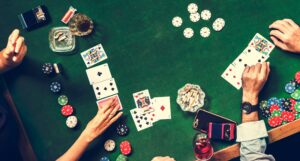Mindset and Psychology in Poker: Developing the Mental Toughness of a Pro


Poker is more than just a game of cards and luck. The mental aspects of poker play a crucial role in determining success at the table, where decisions made under pressure can make or break a player’s fortune. While knowing the rules and strategies is essential, maintaining a strong, focused mindset often separates professionals from amateurs. Developing mental toughness is the key to thriving in poker, where emotional control, patience, and resilience are just as crucial as skillful play.
The psychological challenges in poker are unique. Players must contend with the fear of losing, the frustration of bad beats, the pressure of big pots, and the temptation of emotional decisions that can quickly lead to costly mistakes. To succeed at the highest levels, a player must develop the mental resilience to navigate these challenges and maintain a winning mindset, even when the odds seem stacked against them.
The Importance of Emotional Control
In poker, emotional control is paramount. The fluctuations of winning and losing hands can trigger intense emotional responses, but allowing emotions to influence decision-making can harm a player’s success. The best poker players can maintain composure regardless of their current standing in the game. They understand that poker is a marathon, not a sprint, and staying calm and focused throughout the session is crucial.
Losing a big hand can trigger anger, disappointment, or even self-doubt. However, a professional player recognizes that these emotions are temporary and does not let them cloud judgment. Instead of chasing losses or making impulsive decisions to “get even,” the best players reset their mental state and return to the table with a clear mind. They accept that variance is a part of the game, and no individual hand can define their performance in the long term.
Building Patience and Discipline
Patience is a vital component of mental toughness in poker. Unlike many games that involve continuous action, poker often requires players to sit and wait for the right opportunities to present themselves. A great deal of success in poker comes from folding hands that don’t offer much potential and waiting for better opportunities to arise.
Many amateur players struggle with patience, often making rash moves out of boredom or the urge to stay involved in every hand. However, the ability to fold hands and wait for the right moment to strike distinguishes successful players. Professionals understand that the more disciplined they are in their decisions, the higher their chances of success will be in the long run. Developing this patience is not easy, but it is essential to surviving the poker grind and avoiding costly mistakes.
Dealing with Variance and Losses
One of the most challenging aspects of poker psychology is dealing with variance—the natural fluctuations that come with the game’s inherent uncertainty. No matter how skilled a player is, there will be times when the cards don’t fall their way. Bad beats, coolers, and bad luck can lead to substantial losses, but these setbacks must be managed with mental toughness.
A professional player is prepared for these swings and understands that variance is a natural part of game. They don’t let a string of bad hands or unfortunate outcomes affect their confidence or decision-making.
The Power of Focus and Concentration
Poker is a game of focus, and distractions can quickly lead to costly errors. Maintaining a high concentration level throughout a long session is crucial for optimal decisions. The best players can tune out distractions and remain focused on the task, whether online or in a live setting.
In a live game, distractions can come in many forms—conversations with other players, the temptation to check a phone, or the noise of the casino. In online poker, distractions might involve multitasking or losing focus due to the lack of in-person interaction. A professional poker player, however, can filter out these distractions and maintain a laser focus on the game. This concentration level allows them to make better decisions, spot weaknesses in their opponents, and stay ahead of the game even when things are not going in their favor.
Mental Preparation and Visualization
Top poker players don’t just rely on skills and strategies to prepare for a game. They also invest time in mental preparation, using techniques like visualization and mental rehearsal to sharpen their focus and boost their confidence. Visualization is the process of mentally rehearsing the scenarios that might unfold during a game, such as how to handle a big pot, react to a bluff, or stay calm after losing a hand.
By visualizing success, players strengthen their mental resilience and condition themselves to handle the pressures of real-life situations. This mental preparation often gives professional players an edge over their opponents, as they can enter the game with a strong sense of confidence and clarity. Just as athletes visualize winning a race or making a perfect shot, poker players use this technique to prepare their minds for any situation they may encounter at the table.
The Role of Self-Reflection and Growth
The best poker players are not only focused on winning but also on learning and improving. Self-reflection is a critical part of their mental process. After each session, professionals analyze their play, looking for areas where they could have made better decisions, avoided costly mistakes, or improved their strategy. This commitment to constant growth and improvement is essential to staying ahead of the competition.
Self-reflection also allows players to identify any psychological weaknesses they might have. For example, if players notice they are becoming emotionally frustrated after a few bad hands, they may recognize the need to work on their emotional control. Over time, this continuous self-reflection and adaptation help players refine their mental toughness and build an even stronger mindset.
Developing mental toughness is crucial for achieving success in poker. While mastering the strategies and tactics of the game is necessary, the psychological elements—such as emotional control, patience, resilience, focus, and self-reflection—differentiate professionals from casual players. By cultivating a strong mindset and focusing on the game’s mental aspects, players can enhance their performance, recover from setbacks, and maintain the discipline required to achieve long-term success. Poker, after all, is a battle of the mind, and those who can master it are the ones who rise to the top.

